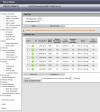root@pve1:/# sensors-detect
# sensors-detect revision $Revision$
# System: FUJITSU PRIMERGY RX2540 M2 [GS01]
# Board: FUJITSU D3289-B1
# Kernel: 5.4.78-2-pve x86_64
# Processor: Intel(R) Xeon(R) CPU E5-2623 v4 @ 2.60GHz (6/79/1)
This program will help you determine which kernel modules you need
to load to use lm_sensors most effectively. It is generally safe
and recommended to accept the default answers to all questions,
unless you know what you're doing.
Some south bridges, CPUs or memory controllers contain embedded sensors.
Do you want to scan for them? This is totally safe. (YES/no):
Module cpuid loaded successfully.
Silicon Integrated Systems SIS5595... No
VIA VT82C686 Integrated Sensors... No
VIA VT8231 Integrated Sensors... No
AMD K8 thermal sensors... No
AMD Family 10h thermal sensors... No
AMD Family 11h thermal sensors... No
AMD Family 12h and 14h thermal sensors... No
AMD Family 15h thermal sensors... No
AMD Family 16h thermal sensors... No
AMD Family 17h thermal sensors... No
AMD Family 15h power sensors... No
AMD Family 16h power sensors... No
Intel digital thermal sensor... Success!
(driver `coretemp')
Intel AMB FB-DIMM thermal sensor... No
Intel 5500/5520/X58 thermal sensor... No
VIA C7 thermal sensor... No
VIA Nano thermal sensor... No
Some Super I/O chips contain embedded sensors. We have to write to
standard I/O ports to probe them. This is usually safe.
Do you want to scan for Super I/O sensors? (YES/no):
Probing for Super-I/O at 0x2e/0x2f
Trying family `National Semiconductor/ITE'... No
Trying family `SMSC'... No
Trying family `VIA/Winbond/Nuvoton/Fintek'... No
Trying family `ITE'... No
Probing for Super-I/O at 0x4e/0x4f
Trying family `National Semiconductor/ITE'... No
Trying family `SMSC'... No
Trying family `VIA/Winbond/Nuvoton/Fintek'... No
Trying family `ITE'... No
Some systems (mainly servers) implement IPMI, a set of common interfaces
through which system health data may be retrieved, amongst other things.
We first try to get the information from SMBIOS. If we don't find it
there, we have to read from arbitrary I/O ports to probe for such
interfaces. This is normally safe. Do you want to scan for IPMI
interfaces? (YES/no):
Found `IPMI BMC KCS' at 0xca2... Success!
(confidence 8, driver `to-be-written')
Some hardware monitoring chips are accessible through the ISA I/O ports.
We have to write to arbitrary I/O ports to probe them. This is usually
safe though. Yes, you do have ISA I/O ports even if you do not have any
ISA slots! Do you want to scan the ISA I/O ports? (YES/no):
Probing for `National Semiconductor LM78' at 0x290... No
Probing for `National Semiconductor LM79' at 0x290... No
Probing for `Winbond W83781D' at 0x290... No
Probing for `Winbond W83782D' at 0x290... No
Lastly, we can probe the I2C/SMBus adapters for connected hardware
monitoring devices. This is the most risky part, and while it works
reasonably well on most systems, it has been reported to cause trouble
on some systems.
Do you want to probe the I2C/SMBus adapters now? (YES/no):
Using driver `i2c-i801' for device 0000:00:1f.3: Wellsburg (PCH)
Next adapter: SMBus I801 adapter at 0580 (i2c-0)
Do you want to scan it? (YES/no/selectively):
Client found at address 0x48
Probing for `National Semiconductor LM75'... No
Probing for `National Semiconductor LM75A'... No
Probing for `Dallas Semiconductor DS75'... No
Probing for `National Semiconductor LM77'... No
Probing for `Analog Devices ADT7410/ADT7420'... No
Probing for `Analog Devices ADT7411'... No
Probing for `Maxim MAX6642'... No
Probing for `Texas Instruments TMP435'... No
Probing for `National Semiconductor LM73'... No
Probing for `National Semiconductor LM92'... No
Probing for `National Semiconductor LM76'... No
Probing for `Maxim MAX6633/MAX6634/MAX6635'... No
Probing for `NXP/Philips SA56004'... No
Probing for `SMSC EMC1023'... No
Probing for `SMSC EMC1043'... No
Probing for `SMSC EMC1053'... No
Probing for `SMSC EMC1063'... No
Next adapter: mga i2c (i2c-1)
Do you want to scan it? (yes/NO/selectively): yes
Now follows a summary of the probes I have just done.
Just press ENTER to continue:
Driver `coretemp':
* Chip `Intel digital thermal sensor' (confidence: 9)
Driver `to-be-written':
* ISA bus, address 0xca2
Chip `IPMI BMC KCS' (confidence: 8)
Note: there is no driver for IPMI BMC KCS yet.
Check https://hwmon.wiki.kernel.org/device_support_status for updates.
To load everything that is needed, add this to /etc/modules:
#----cut here----
# Chip drivers
coretemp
#----cut here----
If you have some drivers built into your kernel, the list above will
contain too many modules. Skip the appropriate ones!


